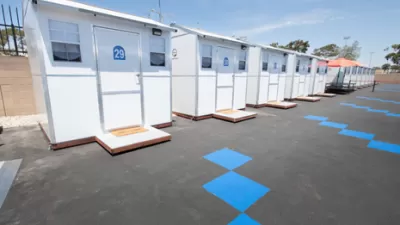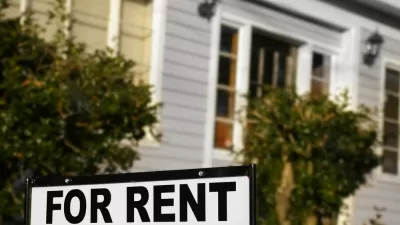An Atlanta City Councilmember and local advocates are pushing for the city to join the ranks of cities that have allowed tiny houses as a solution to housing challenges.
Max Blau examines the tiny house movement for signs of life in the South, where such buildings are still illegal.
"Aside from academic experiments, like the 135-square-foot 'SCADpads' built last year in a Midtown parking deck, developers aren’t allowed to build tiny homes inside the Atlanta city limits. Why not? The city’s code prohibits the construction of single-family homes smaller than 750 square feet. Some local governments have created restrictions on the minimum size of “dwellings” prior to the burgeoning tiny house movement. Looking elsewhere in the metro area, Gwinnett and Dekalb counties require single-family homes to be at least 1,000 square feet."
Blau reports, however, that Atlanta City Councilmember Kwanza Hall is seeking legislation that would allow tiny houses in eastside neighborhoods like Old Fourth Ward and Inman Park, which councilmember Hall represents. Councilmember points to the areas many "non-conforming lots" as ideal for tiny houses and micro-unit apartments. "He envisions a wide variety of different types of people such as college graduates, young professionals, homeless people, and empty nesters occupying the affordable homes," writes Blau.
The Atlanta City Council is expected to approve legislation next month, report Blau, that would enable planners to study code refinements that would pave the way for the new variety of housing.
FULL STORY: When will Atlanta join the tiny house movement?

Alabama: Trump Terminates Settlements for Black Communities Harmed By Raw Sewage
Trump deemed the landmark civil rights agreement “illegal DEI and environmental justice policy.”

Planetizen Federal Action Tracker
A weekly monitor of how Trump’s orders and actions are impacting planners and planning in America.

How Atlanta Built 7,000 Housing Units in 3 Years
The city’s comprehensive, neighborhood-focused housing strategy focuses on identifying properties and land that can be repurposed for housing and encouraging development in underserved neighborhoods.

In Both Crashes and Crime, Public Transportation is Far Safer than Driving
Contrary to popular assumptions, public transportation has far lower crash and crime rates than automobile travel. For safer communities, improve and encourage transit travel.

Report: Zoning Reforms Should Complement Nashville’s Ambitious Transit Plan
Without reform, restrictive zoning codes will limit the impact of the city’s planned transit expansion and could exclude some of the residents who depend on transit the most.

Judge Orders Release of Frozen IRA, IIJA Funding
The decision is a victory for environmental groups who charged that freezing funds for critical infrastructure and disaster response programs caused “real and irreparable harm” to communities.
Urban Design for Planners 1: Software Tools
This six-course series explores essential urban design concepts using open source software and equips planners with the tools they need to participate fully in the urban design process.
Planning for Universal Design
Learn the tools for implementing Universal Design in planning regulations.
Caltrans
Smith Gee Studio
Institute for Housing and Urban Development Studies (IHS)
City of Grandview
Harvard GSD Executive Education
Toledo-Lucas County Plan Commissions
Salt Lake City
NYU Wagner Graduate School of Public Service





























